Spring forward - clocks go forward on Sunday
Saturday, March 29, 2025
 "Spring forward" - clocks are advanced one hour on Sunday. At 2.00 am clocks and watches, plus any device with a timer, eg TVs, computers, mobile phones and car clocks, are adjusted by one hour. "Spring forward" - clocks are advanced one hour on Sunday. At 2.00 am clocks and watches, plus any device with a timer, eg TVs, computers, mobile phones and car clocks, are adjusted by one hour.
[Image courtesy of The Solid Signal Blog]
Nowadays, many devices do this automatically, but most do not, even though we are well into the 21st Century. I shall have to manually adjust all our clocks, bar one; our two TVs, our kitchen oven, both cars and my wristwatch.
But will it be the last time we adjust our clocks, watches and timers?
The Historical Context
Adjusting the clocks was introduced in the UK during the first world war to allow more daylight working hours. And it’s never been changed since.
 
WW1 postcard [The Old Farmer's Almanac] [Image courtesy of The Independent]
As for Spain, their time used to be based on Greenwich Mean Time (GMT) like the UK and Portugal, but General Franco was pressurised to change to Central European Time (CET) by Adolf Hitler around the time of the Spanish Civil War (1936-1939). Since then, Spain has been out of step.
On October 27, Spain will put its clocks back one hour, signalling the start of winter. However, this practice of adjusting the time has its days numbered. The farce of putting the clocks back in Autumn and forward in the Spring is to come to an end, at least in Spain.
Under current regulations, 2026 will be the last year in which Spaniards modify their clocks and watches, ending a practice that has been in place since the 1970s.
This discrepancy between the official time and daylight has generated criticism, as it affects the biological cycles of the population and complicates the balance between personal and working life.
Returning to Greenwich Mean Time (GMT) is still an option, but it would imply significant adjustments in daily habits.
Moving forward in Spain
For now, the debate on which time to choose will remain on the public agenda. Everything points to Spain preparing to say goodbye to the time change, joining other countries that have already decided to adjust their clocks for the last time.
Since 1974, the main reason for moving clocks forward or backward has been to take advantage of natural light and reduce energy consumption. However, recent studies indicate that the impact of this measure is minimal at present, which has led to questions about its usefulness. the main reason for moving clocks forward or backward has been to take advantage of natural light and reduce energy consumption. However, recent studies indicate that the impact of this measure is minimal at present, which has led to questions about its usefulness.
Despite the doubts, the Boletin Oficial del Estado (BOE) [Official State Gazette] has confirmed that the transition between winter and summer time will be maintained until 2026, as established by Royal Decree 236/2002.
[Photo courtesy of the BOE]
After that date, Spain will have to decide whether to adopt a fixed schedule and, if so, whether it prefers a summer or a winter timetable. This measure not only requires political consensus, but also a massive information campaign to avoid confusion among the populace.
The decision to stop changing the time has also reignited another discussion: Spain's time zone. According to its geographical location, the country should be governed by the Greenwich Meridian (GMT), as is the case in the United Kingdom and Portugal.
Until 1940 it was so, until Francisco Franco, under pressure from Adolf Hitler, adopted Central European Time (CET) to align with other countries on the European continent.
Conclusion
 So, the farce of changing the clocks in Spain is to end in 2026, and not before time (excuse the play on words!). The question is will Spain revert to GMT where it belongs, alongside the UK, Ireland, Portugal and its own Canary Islands? Or will Spain remain on CET aligned with France, Germany and threst of western Europe. So, the farce of changing the clocks in Spain is to end in 2026, and not before time (excuse the play on words!). The question is will Spain revert to GMT where it belongs, alongside the UK, Ireland, Portugal and its own Canary Islands? Or will Spain remain on CET aligned with France, Germany and threst of western Europe.
Common sense dictates that they should re-align with their own Canary Islands, Portugal, the UK and Ireland, but since when did common sense prevail in politics?
Map of time zones [Time and Date]
Links:
Clocks go back on Sunday - but this practice's days are numbered!
Did you change your clocks and watches?
Spring forward, Fall back
When do the clocks change? - GOV.UK
Photos and Images
Boletin Oficial del Estado, The Independent, The Old Farmer's Almanac, The Solid Signal Blog, Time and Date,
© Paul Whitelock
Acknowledgements:
Boletin Oficial del Estado, Facebook, Time and Date, Wikipedia
Tags:
Adolf Hitler, BOE, Boletin Oficial del Estado, Canary Islands, CET, Central European Time, Daniela Machorro, Facebook, General Franco, GMT, Greenwich Mean Time, Ireland, Mundo Deportivo, Paul Whitelock, Portugal, putting the clocks back in Autumn, putting the clocks forward in Spring, Royal Decree 236/2002, Spanish Civil War, The History Man, The Independent, The Old Farmer's Almanac, The Solid Signal Blog, Time and Date,
 0
Like
Published at 9:41 AM Comments (0)
0
Like
Published at 9:41 AM Comments (0)
The "apprentice" Spanish gardener
Friday, March 28, 2025
 I grew up in a rural area in North Devon (England) where I lived in three different houses between the ages of nought and 14. I grew up in a rural area in North Devon (England) where I lived in three different houses between the ages of nought and 14.
I remember that my Dad, from rural South Wales, always had either a garden or a big allotment.
An English vegetable garden [Photo: Country Living Magazine]
The early years
 My first home on Earth was a brand-new council house with a massive garden on Gould Road on the Forches Cross Estate in Barnstaple. My first home on Earth was a brand-new council house with a massive garden on Gould Road on the Forches Cross Estate in Barnstaple.
Dad also kept chickens, for their eggs and the occasional roast Sunday lunch.
But I was only a tot, back then.
` [Photo: The Conversation]
My brother turned up when I was three and shortly after that our aspirational parents bought an old terraced house in another part of town.
9 Cyprus Terrace was a 19th Century 2-up-2-down with no inside toilet and no bathroom. However, dad, a competent handyman (we didn't say DIY back then), created a WC and bathroom in various outhouses. There was no garden so he got himself an allotment where he grew most of our vegetables. I started to take an interest, and dad encouraged me.
Our third house, 54 Broadfield Road, only had a tiny back garden, so dad retained his allotment.
 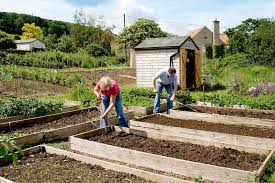 
9 Cyprus Terrace [Rightmove] Allotment [Gardeners' World] 54 Broadfield Road [Zoopla]
By the time we moved to Exeter, the county town, when I was 14, I had become really interested in gardening. We lived in two houses there. Each had a large garden where I continued to hone my skills.
 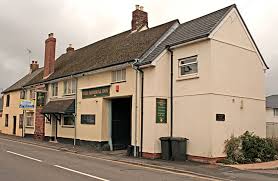
36 Princes Square, Exeter [Rightmove] The Admiral Vernon, Alphington [Exeter Memories]
After university, during which time I did no gardening, and marriage at 24, Jeryl and I got our first house in Walkden (Greater Manchester) which had small gardens front and year.
When we moved to Warrington (Cheshire) in 1980 we had a decent-sized garden once again and I took up the hobby again in earnest. I cultivated rhubarb, strawberries, Brussels sprouts, courgettes and spinach. We also had an old established apple tree.
 
74 Normanby Road, Walkden [Rightmove] 1 Parry Drive, Thelwall, Warrington [Paul Whitelock]
After my marriage ended and I retired early, I lived in a country cottage in Bryn-Y-Maen, near Colwyn Bay (N. Wales) for a couple of years, where I kept my hand in, before I returned to England where I bought a run-down detached house in Latchford (Warrington), with gardens to the front and side.
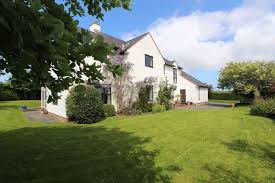 
Minfford, Bryn-Y-Maen, N Wales [Zoopla] Tunstall Villa, Latchford [On the Market]
In between renovating the house, I managed to find time to keep my hand in at gardening by trying out some new crops, such as potatoes, onions and broccoli.
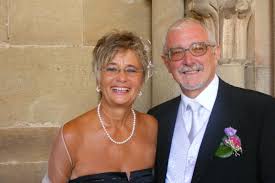 Then in 2008 I emigrated to Spain, to Ronda (Malaga) in Andalucia, where I owned an apartment. I started off living in Montejaque (also Malaga) in the village house of the lady who was to become my second wife. Rita's house had no garden. Then in 2008 I emigrated to Spain, to Ronda (Malaga) in Andalucia, where I owned an apartment. I started off living in Montejaque (also Malaga) in the village house of the lady who was to become my second wife. Rita's house had no garden.
When we moved to Fuente de la Higuera (Ronda) in 2011, where we still live, one of the criteria for our search for a house was a garden. Villa Indiana has over 10,000 square metres (more than a hectare), so I've had plenty to go at.
Rita and Paul get married [Photo: HMR]
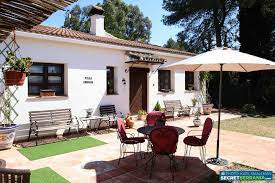 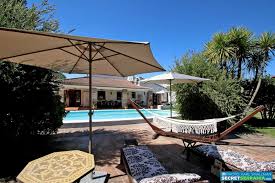
Rear view of Villa Indiana [A1 Inmobiliaria] The facade of Villa Indiana [Karl Smallman]
Although the ground is basically clay, therefore hard to work and not very fertile, I have become more adventurous, trying out crops I'd never grown before.
This is when I found out that I'm a novice when it comes to gardening in a hot Mediterranean climate. Very different to the cool, rainy climate of North West England.
With over 300 days of sun a year; cold winters and a shortage of rainfall, it's quite a challenge.
Bougainvilleas die on me, strawberries do not thrive, tomatoes stay small and other crops and some flowers shrivel and die or get eaten by birds and other pests.
With advice from my gardener Rafael and Spanish neighbours over the years I have learned which crops do well and which to avoid.
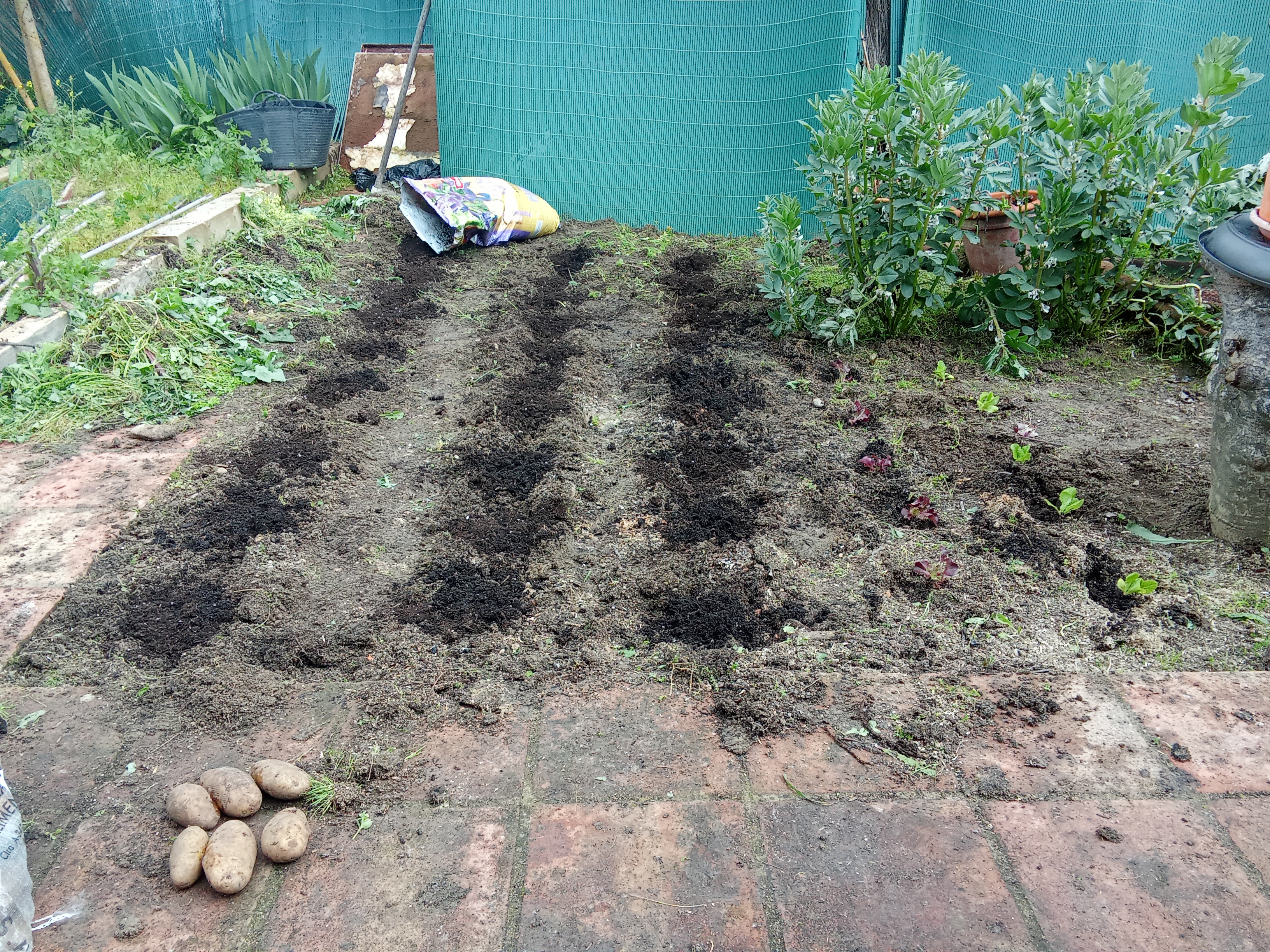 Crops that prosper include artichokes, potatoes, and runner and broad beans. Curly kale and lettuce also do well. Crops that prosper include artichokes, potatoes, and runner and broad beans. Curly kale and lettuce also do well.
We also have figs, brevas and olives, which we inherited from the previous owners.
In the last couple of years I have planted a dozen different fruit trees. Three have died, scorched/waterlogged, but the rest are doing OK.
New plantings [Photo: Paul Whitelock]
2025

It's Spring and I am just getting going. The heavy rains have stopped, at least for the time being, and the frosts are finished.
This week alone I've cleared masses of weeds from my raised beds and planted 60 seed potatoes, 3 types of lettuce and 2 kinds of onions, red and white.
Yesterday, it was garlic's turn.
[Photo courtesy of Wikipedia]
The Apprentice Spanish Gardener

I'm still learning. I've improved the quality of the soil by adding my own home-made compost and commercial sustrato, plus some sand.
I love working outside in the fresh air. If it's too hot in the sun I head for the shade. If it's too cold, I layer up.
At 74 years of age, I have to take frequent "spells" but it does me good to be outside taking on board Vitamin D and breathing uncontaminated air. My upper body and my troublesome back are stronger than they ever were. Only my post-Covid legs and loss of balance are an impediment.
[Image courtesy of Vitabella Senior Living]
Sources:
John Albert Whitelock (d.)
Rafael Fornet
Rita Whitelock
and the following books:
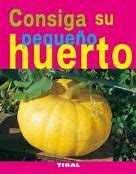 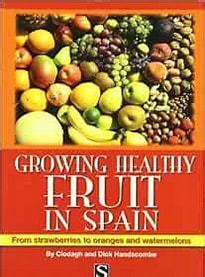 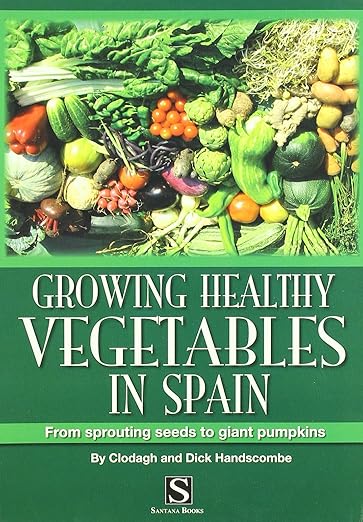  
Some books are out of print, but there may be used copies available. Check out www.amazon.com
Photos:
A1 Inmobiliaria, Country Living Magazine, Exeter Memories, Gardeners' World, HMR, John Albert Whitelock, Karl Smallman, On the Market, Paul Whitelock, Rafael Fornet, Rightmove, Rita Whitelock, Secret Serrania, The Conversation, Zoopla, Vitabella Senior Living, Wikipedia
© Pablo de Ronda
Tags:
1 Parry Drive, 10 Ide Lane, 10,000 square metres, 19th Century, 2-up-2-down, 3 types of lettuce, 300 days of sun a year, 36 Princes Square, 54 Broadfield Road, 60 seed potatoes, 74 Normanby Road, 74 years of age, 9 Cyprus Terrace, A1 Inmobiliaria, adding my own home-made compost, advice, after university, Alphington, allotment, Andalucia, apartment, apple tree, artichokes, aspirational parents, Barnstaple, bathroom, bougainvilleas, breathing uncontaminated air, brevas, broad beans, broccoli, Brussels sprouts, Bryn-Y-Maen, Cheshire, chickens, cold winters, Colwyn Bay, cool rainy climate, council house, country cottage, Country Living Magazine, courgettes, crops that prosper, curly kale, dad encouraged me, decent-sized garden, DIY, eaten by birds, Exeter, Exeter Memories, figs, first house, Forches Cross Estate, fresh air, fresh eggs, fruit trees, Fuente de la Higuera, garden, Gardeners' World, garlic, Gould Road, Greater Manchester, handyman, heavy rains have stopped, hectare, hot Mediterranean climate, emigrated to Spain, frosts are finished, If it's too cold, I have to take frequent "spells", I head for the shade, I layer up, impediment, I returned to England, I've cleared masses of weeds, Jeryl, Karl Smallman, Latchford, lettuce, loss of balance, Malaga, marriage at 24, Minfford, Montejaque, my gardener Rafael, my troublesome back, my upper body, no bathroom, no garden, no inside toilet, North Devon, N. Wales, North West England, novice when it comes to gardening, olives, onions, On the Market, Paul Whitelock, pests, post-Covid, post-Covid legs, potatoes, quality of the soil, raised beds, renovating the house, rhubarb, Rightmove, Rita, roast Sunday lunch, Ronda, run-down detached house, runner beans, second wife, shortage of rainfall, South Wales, Spanish neighbours, spinach, Spring, strawberries, sustrato, terraced house, The Apprentice Spanish Gardener, The Conversation, Thelwall, tomatoes, too hot in the sun, tot, Tunstall Villa, vegetables, village house, Villa Indiana, Vitamin D, Walkden, Warrington, WC, Wikipedia, Zoopla,
 3
Like
Published at 6:29 PM Comments (0)
3
Like
Published at 6:29 PM Comments (0)
SPRING? - has it sprung at last!
Wednesday, March 26, 2025
Spring has arrived in southern Spain at last, albeit a bit later than normal.
Or has it?
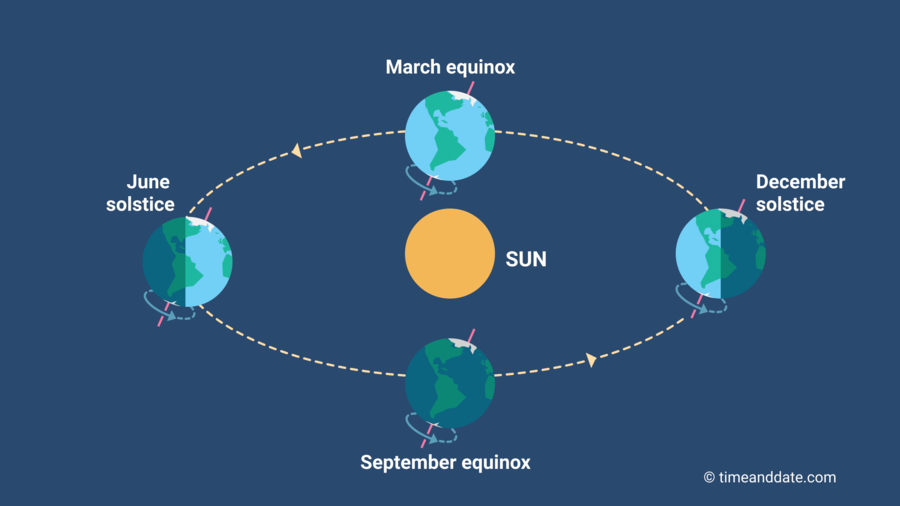 At the spring equinox, also called the vernal equinox, days and nights are approximately twelve hours long, with day-time length increasing and night-time length decreasing as the season progresses until the summer solstice. At the spring equinox, also called the vernal equinox, days and nights are approximately twelve hours long, with day-time length increasing and night-time length decreasing as the season progresses until the summer solstice.
[Image courtesy of timeanddate.com]
The spring equinox is in March in the Northern Hemisphere.
Spring and "spring-time" refer to the season, and also to ideas of rebirth, rejuvenation, renewal, resurrection and regrowth.
Meteorological Spring
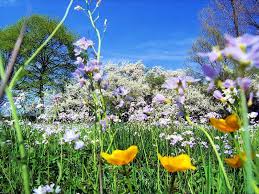 Meteorologists generally define four seasons in many climatic areas: spring, summer, autumn (fall), and winter. These are determined by the values of their average temperatures on a monthly basis, with each season lasting three calendar months. Meteorologists generally define four seasons in many climatic areas: spring, summer, autumn (fall), and winter. These are determined by the values of their average temperatures on a monthly basis, with each season lasting three calendar months.
In the USA and Europe the spring months are March, April, and May.
Spring [Photo courtesy of Wikipedia]
In 2025 meteorological spring began on Saturday 1 March.
Astronomical and Solar Spring
 In the Northern Hemisphere, solar reckoning was traditionally used with the solstices and equinoxes representing the midpoints of each season, however, the astronomical vernal equinox (varying between 19 and 21 March) can be taken to mark the first day of spring with the summer solstice (around 21 June) marked as first day of summer. In the Northern Hemisphere, solar reckoning was traditionally used with the solstices and equinoxes representing the midpoints of each season, however, the astronomical vernal equinox (varying between 19 and 21 March) can be taken to mark the first day of spring with the summer solstice (around 21 June) marked as first day of summer.
[Image courtesy of AccuWeather]
By solar reckoning, Spring is held to begin 1 February and last until the first day of Summer on May Day, with the summer and winter solstices being marked as Midsummer and Midwinter respectively, instead of as the beginning of the season as is the case with astronomical reckoning.
Springtime in Ronda
Since Monday of this week (24 March), the weather has been spring-like. There has been very little rain, although my garden is still waterlogged and water continues to rush down the hill, through my garden and onwards down to the river Guadalcobacin at the bottom of the valley.
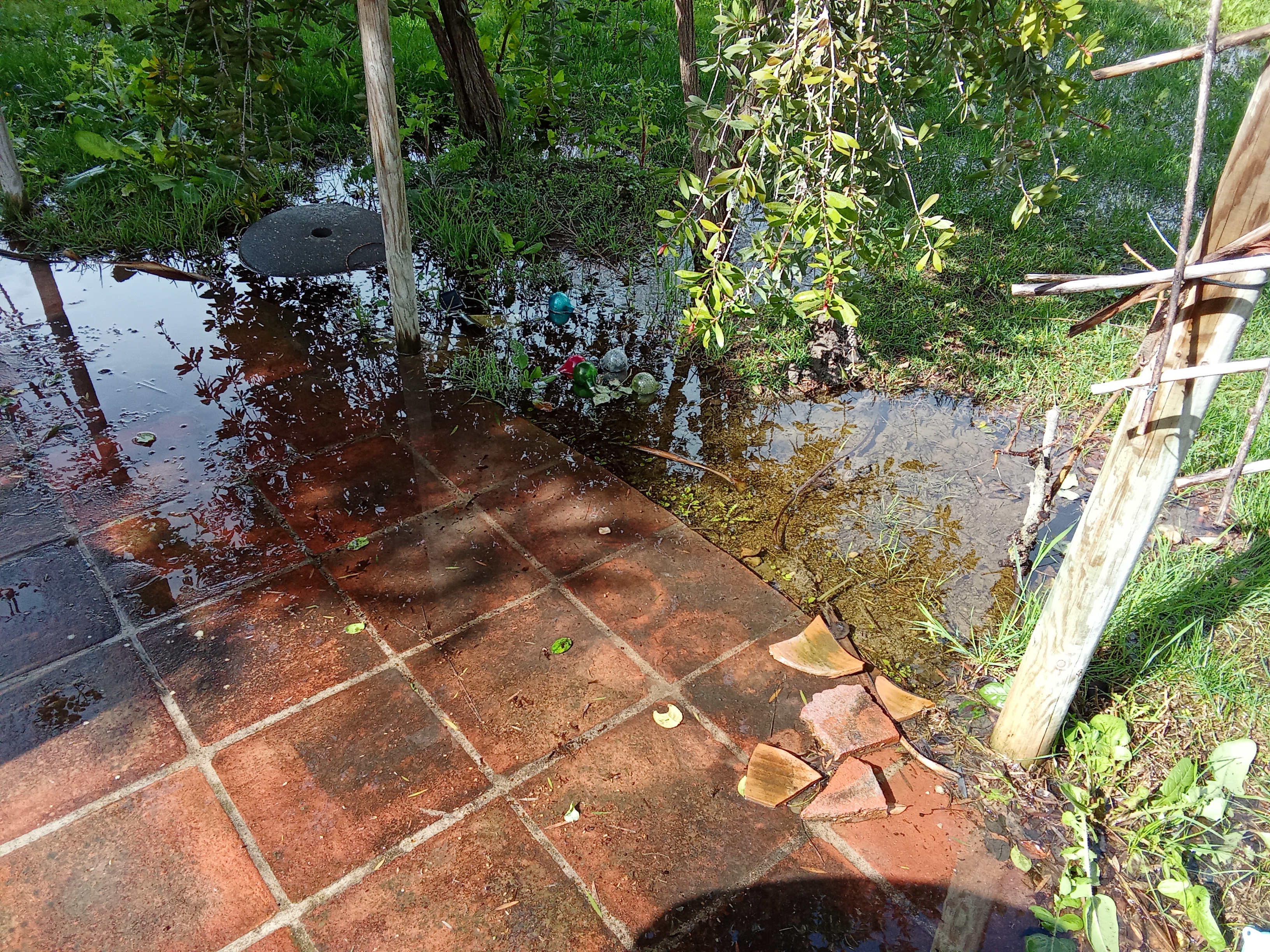 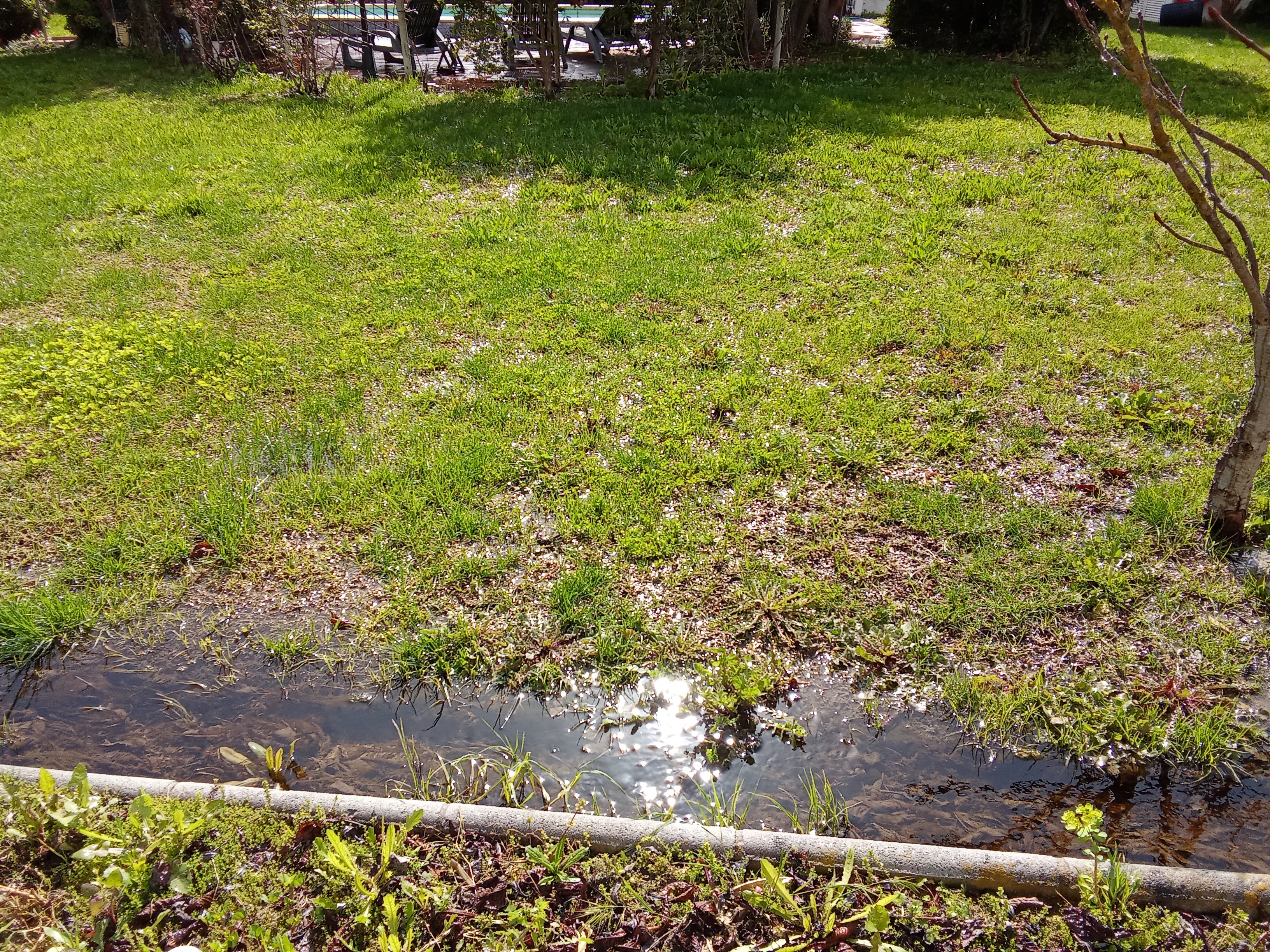
Our flooded garden [Photos: Paul Whitelock]
So, yesterday, Tuesday, I decided it was time to get some veg in the ground. It's a good time to plant seed potatoes and, surprisingly, lettuce.
At the garden centre I got half a sack (12 kilos) of potatoes for just over 1 euro per kilo and 20 lettuce seedlings (two different types - one red, one green) for 12 centimos each.
First job was to clear the weeds from my raised beds which had rocketed to a foot tall (30 centimetres) after all the rain.
The ground in my huerto was very wet so I didn't need to water anything in. I planted 30 seed potatoes and all the lettuce.
When it came to the planting I upgraded the soil with a mixture of my own home-made compost and a sack of commercial sustrato that was lying around.
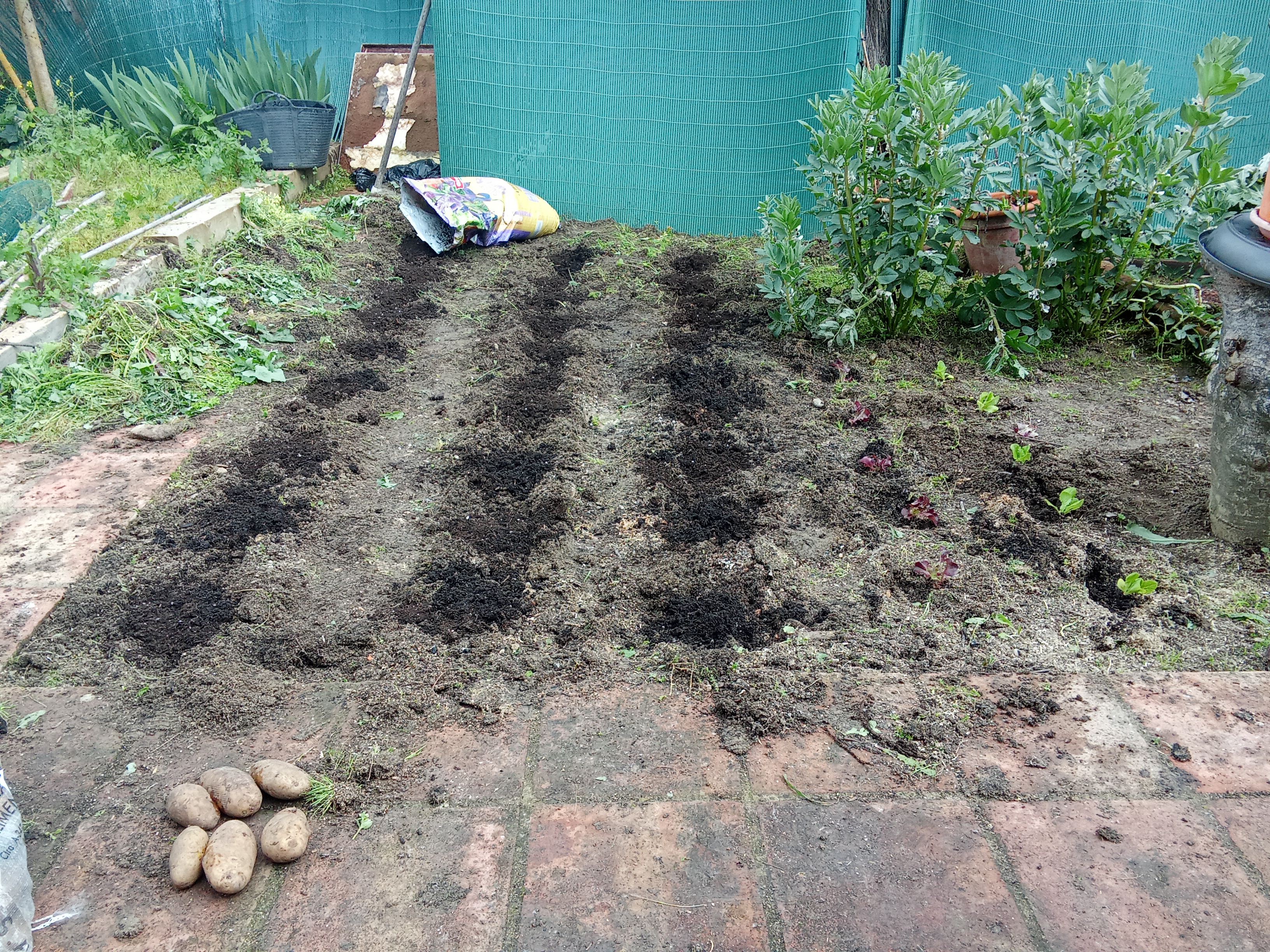 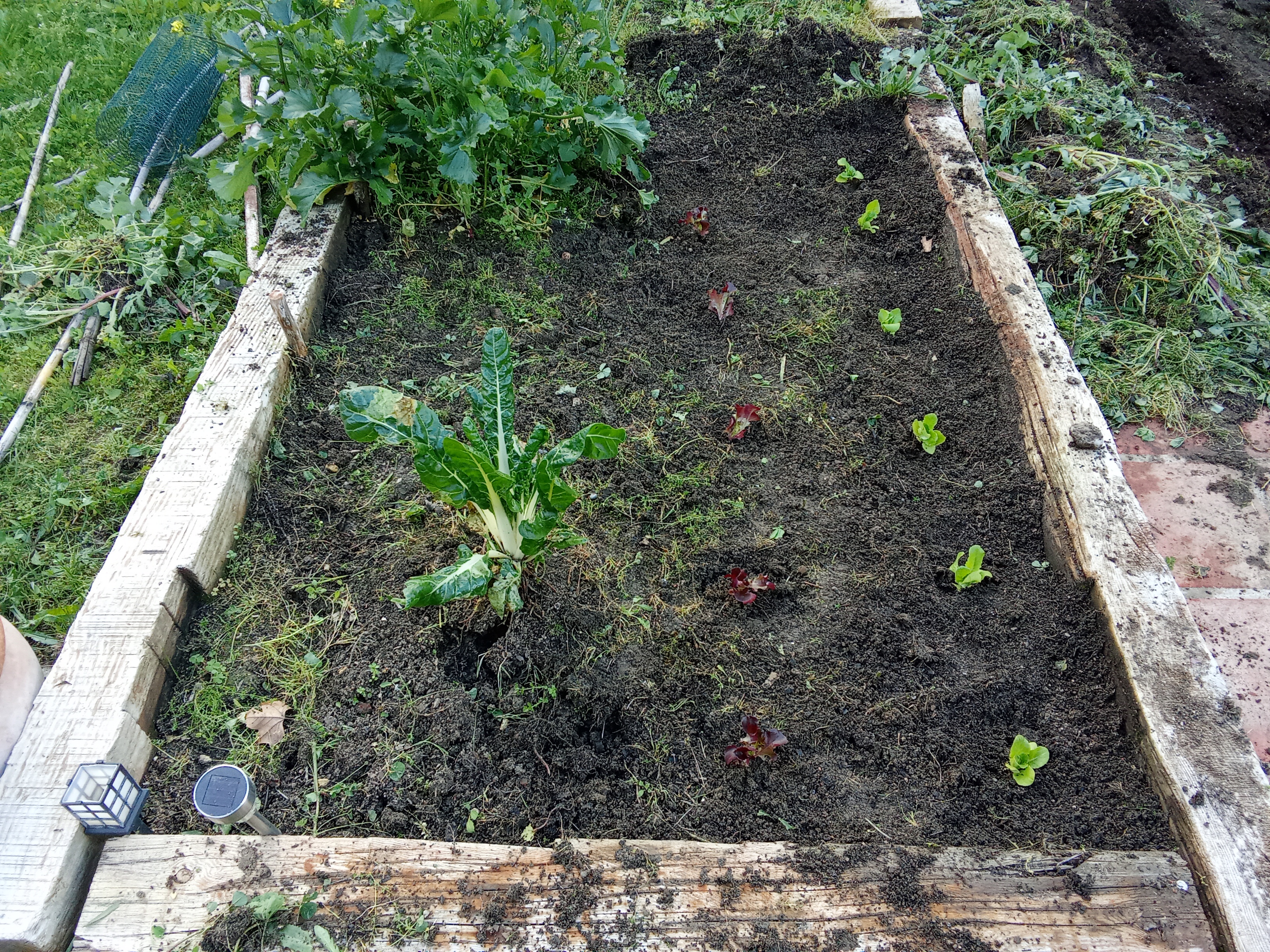
Freshly planted spuds and lettuce [Photos: Paul Whitelock]
By the time I had finished, my 74-year-old body was creaking, tired and grubby, so I had a wash before heading to the local bar for a well-earned drink or three before dinner.
Today I plan to clear another bed and plant more spuds.
Watch this space!
© Pablo de Ronda
Photos:
AccuWeather, Paul Whitelock, Wikipedia, www.timeanddate.com
Acknowledgements:
John Albert Whitelock (my late dad, for giving me a love of gardening), Time and Date, Wikipedia
Tags:
AccuWeather, April, Astronomical spring, autumn, average temperatures, clear the weeds, commercial sustrato, Europe, fall, garden, garden centre, Guadalcobacin, half a sack of potatoes, home-made compost, huerto, I upgraded the soil, John Albert Whitelock, lettuce, lettuce seedlings, March, May, May Day, Meteorological Spring, meteorologist, Northern Hemisphere, Pablo de Ronda, Paul Whitelock, raised beds, rebirth, rejuvenation, renewal, resurrection, regrowth, Saturday 1 March, season, seed potatoes, solar reckoning, solar spring, Spring, spring equinox, "springtime", Springtime in Ronda, solar reckoning, summer, summer, solstice, sustrato, Time and Date, United States, vernal equinox, waterlogged, well-earned drink, Wikipedia, winter, www.timeanddate.com,
 0
Like
Published at 8:55 AM Comments (0)
0
Like
Published at 8:55 AM Comments (0)
RAIN -Yes or No?
Monday, March 24, 2025
 Water is essential for life and for living. Water is essential for life and for living.
Without water our land turns to desert, crops don't grow and we have nothing to wash with or to drink.
Hygiene goes out of the window.
[Photo: Britannica]
Recent History
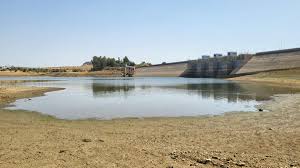 In parts of Spain, especially in the south, Andalucia, water has been in short supply for several years. In parts of Spain, especially in the south, Andalucia, water has been in short supply for several years.
Many embalses (reservoirs) were technically empty!
A sequia (drought) was declared!
[Photo: elDiario.es]
In some areas water has been rationed and/or turned off at night. Beaches on the Costa del Sol have had their beach showers closed down.
Everybody, from farmers to horticulturalists to wine-growers, was praying for rain.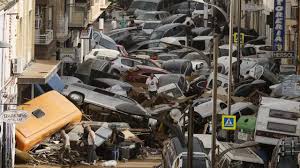
Then around St Valentine's Day 2025 (February 14) all hell was let loose. Several danas hit the south and east of the country.
The worst dana was in the area around Valencia, Spain's fourth largest city by population. 306.000 people were affected, 316 died, 11.242 houses were damaged or destroyed, 141.000 vehicles were washed away and subsequently written off, and 800 km. de roads were damaged.
[Photo: 20 Minutos]
Since February there has been dana after dana, storm after storm, flood upon flood in the whole of the Iberian peninsula.
We wanted rain, and we got it!
What has happened?
Some reservoirs are so full that 1000s of litres have been released into the sea.
In Andalucia beaches have been washed away, chiringuitos wrecked, previously dry watercourses have been inundated and buildings damaged.
The A397 between Ronda and San Pedro de Alcantara (both Malaga) is blocked by a massive rockfall and a severely damagedcarriageway. The repair is expected to take six months and last well into the autumn. This breach of the quickest and most direct from the Serrania de Ronda to the coast has presented a number of problems:
- thousands of workers displace from inland to the coast every day for work
- the bus connection has gone
- the effect on tourism will be massive
Alternative routes involve long detours and increased journey times.
It's a critical situation.
In Ronda itself, where I live, my large garden has been a lake for weeks.
I cleared all the acequias and arroyos of vegetation and other blockages, and now water rushes constantly out of my garden. My somewhat brown-looking lawn hasn't seen so much water in the 15 years I have lived in our finca.
The pedania where I live is an agricultural and wine-growing area. My neighbours all work the land in some way.
They've been crying out for rain for the last seven years. The last time we had heavy rain for a sustained period was in 2018. Now, they've got what they wanted - big style!
Complaints
Now they have started to complain, that the rain is too much and has become destructive. Their fields are flooded, crops are damaged and they cannot work the land because it's turned to mud.
"¡Basta con el agua!" they chorus.
I agree. It's a paradox. Yes, we needed rain, but not this much all in one go!
The aftermath
Once the rains stop, there'll be lots of clearing up to do.
Weeds are a problem - you can almost see them growing!
Heavy rain means damage to infrastructure and wooden garden furniture.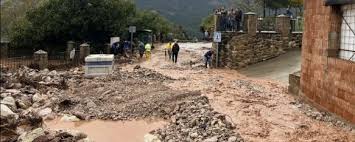
Several villages in the Serrania de Ronda have suffered significant damage.
Parts of Ronda, the capital of the comarca; Benaojan; Jimera de Libar; Cortes de la Frontera; Cañada del Real Tesoro.
Jimera de Libar [CharryTV.com]
And what about the effect on tourism, the main industry hereabouts? People are less inclined to travel when the weather is bad; bars and restaurants are frequented less; nobody goes to a beach where it's raining heavily.
Visitors do not walk, hike, bird-watch, rock-climb, hang-glide, cycle, do "canyoning" or take balloon flights in the rain.
Some potential visitors decide not to come and cancel their bookings!
Personal
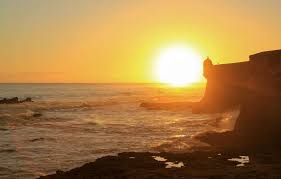 As for me, and despite the problems outlined earlier, I shall survive. People assume that I emigrated to Andalucia for the climate (normally the region enjoys 300 days of sunshine per year), but that is not the case. As for me, and despite the problems outlined earlier, I shall survive. People assume that I emigrated to Andalucia for the climate (normally the region enjoys 300 days of sunshine per year), but that is not the case.
Whilst I like fine weather, it's not that important for me. I'm a reluctant sun-bather, although an occasional excursion to the beach does not come amiss and it's only an hour or so away.
300 days of sun [Photo: Spain Guides]
I came to live in Spain for the ambiente; for the thrill of living in a relaxed and beautiful country; because I've always felt at home here since I first visited 55 years ago; because I love the food; because my money stretches a lot further in Spain; and because I'm a fluent Spanish-speaker, which "oils the wheels" in every way.
***
I consider myself fortunate. From humble beginnings I am now living the dream in comparative luxury.
I am the grandson of a Welsh coal-miner. My dad escaped the "pit" and was sent to England to stay with relatives, first in London and then in Barnstaple, Devon. When the Second World War came he joined the RAF and was based at RAF Chivenor.
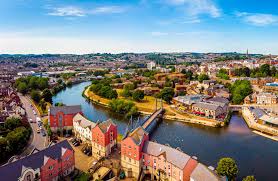 He met and married my mum in 1948 and I was their first-born. We moved to a brand-new council house in the North Devon town for three years, then mum and dad bought a terraced house, did it up, sold it, bought the rental house where my gran was living, sold that a couple of years later and moved to Exeter, the county town of Devon, where they bought and sold two houses, improving their lot every time. He met and married my mum in 1948 and I was their first-born. We moved to a brand-new council house in the North Devon town for three years, then mum and dad bought a terraced house, did it up, sold it, bought the rental house where my gran was living, sold that a couple of years later and moved to Exeter, the county town of Devon, where they bought and sold two houses, improving their lot every time.
I went to state schools (ie free), to university on a full grant, became a teacher then a schools inspector/adviser.
Exeter [Photo: Martin & Co]
When I retired early, I moved to Spain and now live in the countryside just outside Ronda in a big finca, with a swimming pool and more than a hectare of land (10,000 square metres). I would never have achieved that in the UK.
I'm a pensioner and so is the Hausfrau (my second wife of 15 years is German). Yet, in addition to our domicilio (main home) we have two further houses in Montejaque (Malaga), a village of 940 inhabitants, 20 minutes from Ronda. We earn a modest supplementary income from holiday rentals.
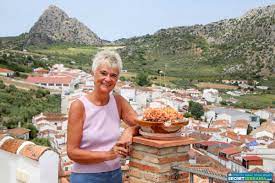 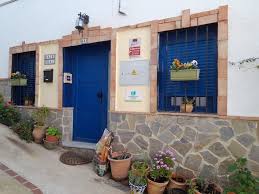
Rita on the roof terrace at Casa Rita [Karl Smallman] Casa Real [Paul Whitelock]
An added bonus to living in southern Spain, is that Vladimir Putin's nuclear weapons do not currently reach Spain, should the worst come to the worst.

We're both well into our 70s and we have decided that 2025 is the year we plan to travel, before we no longer can.
Three trips are already in place, but I have a sort of "bucket list" for other places we'd like to visit, mainly in Europe, although Canada, Cuba, New Zealand and the Philippines are also under consideration.
In theory, given good health, we have all the time in the world!
Endword
The rain we so badly needed has come, but that's enough for now.
As for our travel plans, click here:
2025 - Our year of travel - Eye on Spain
Other links:
At last – good weather! It’s pouring down! - Help me, Ronda
BREAKING NEWS - DANA – Who or what is it?
The biggest car scrapyard in Spain's history - Help me, Ronda
“The Rain in Spain …..”
© Pablo de Ronda
Photos:
20 Minutos, AS, Britannica, CharryTV.com, elDiario.es, Karl Smallman, Martin & Co, Paul Whitelock, Spain Guides
Tags:
Andalucia, beaches on the Costa del Sol, beach showers turned off, dana, drought, embalse, farmers, February 14, flood, horticulturalists, houses were destroyed, people died, praying for rain, rain, reservoir, St Valentine's Day 2025, sequia, Spain, Spain's fourth largest city by population, storm, Valencia, vehicles were washed away, water, water has been rationed, wine-growers, written off
 0
Like
Published at 12:55 PM Comments (1)
0
Like
Published at 12:55 PM Comments (1)
March 17 is St Patrick's Day
Tuesday, March 18, 2025
St Patrick's Day - March 17
 Of the four patron saints' days in the British isles, I think St Patrick's Day in the Republic of Ireland is the most celebrated. St Andrew's Day in Scotland, November 30, comes second and St David's Day in Wales, March 1, comes in in third place. The English don't seem too bothered about St George's Day, which is "celebrated" (not) on April 23. Of the four patron saints' days in the British isles, I think St Patrick's Day in the Republic of Ireland is the most celebrated. St Andrew's Day in Scotland, November 30, comes second and St David's Day in Wales, March 1, comes in in third place. The English don't seem too bothered about St George's Day, which is "celebrated" (not) on April 23.
[Image courtesy of CEXT]
Introduction
 The only patron saint who merits an official bank holiday in his home country is St Patrick in Ireland. The only patron saint who merits an official bank holiday in his home country is St Patrick in Ireland.
I have no connection with Ireland, but I have often celebrated "Paddy's Day", as today is affectionately known.
No Scottish connection either, other than I once owned a timeshare on the Isle of Arran.
[Stained glass of St Patrick by Irish Central]
Being half-Welsh, St David's Day was also important, especially at university where I had a Welsh girlfriend for a while.
St George's Day always came and went with a whimper.
St Patrick's Day 2025
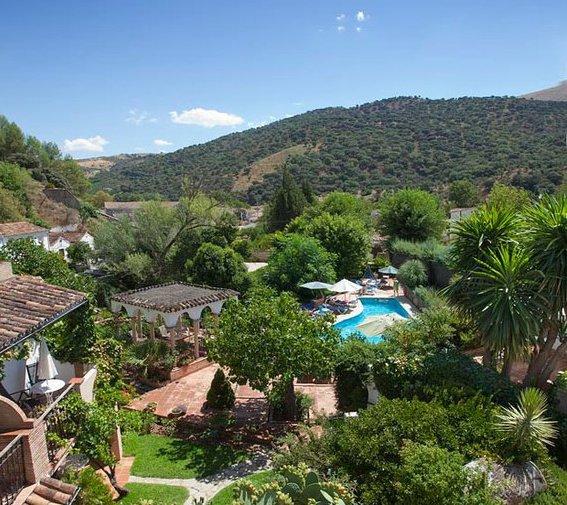 Today the missus and I are "celebrating" by going for dinner on the re-opening-under-new-management of the restaurant at Hotel Molino del Santo in Estación de Benaoján (Málaga). Today the missus and I are "celebrating" by going for dinner on the re-opening-under-new-management of the restaurant at Hotel Molino del Santo in Estación de Benaoján (Málaga).
Rita is German and her country does not appear to have a patron saint.
Back to Molino del Santo, this fine establishment in a refurbished mill which first opened its doors as a boutique hotel and restaurant in 1987 has been closed since the end of November 2024 and has undergone a makeover.
Aerial photo of Hotel Molino del Santo [Archive]
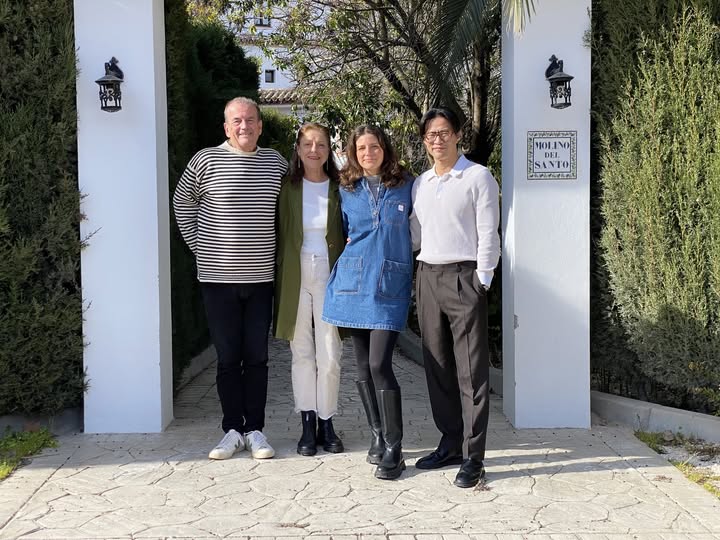 New "owners" are Carmen and Martin. Carmen is the elder daughter of owners Andy Chapell and Pauline Elkin, who retired in 2023. Carmen was born locally and attended schools in Benaoján, Ronda and San Pedro, before university in the UK. She is bilingual. New "owners" are Carmen and Martin. Carmen is the elder daughter of owners Andy Chapell and Pauline Elkin, who retired in 2023. Carmen was born locally and attended schools in Benaoján, Ronda and San Pedro, before university in the UK. She is bilingual.
Her partner Martin originates from Norway.
Apart from the alterations and improvements, there is a new menu, and a new website, but most of the staff remain as before.
Andy, Pauline, Carmen and Martin [Jon Clarke]
We look forward to seeing Inma, head receptionist; Víctor, the head waiter; other waiting staff we might know and, probably Andy and Pauline hovering in the background, keeping an eye on things. Andy may well be serving behind the bar, and Pauline helping out in the restaurant.
Other locals I know may well be in the bar - Enrique, Moisés and Carlos.
Whether there will be anything special for St Patrick's Day, like free Guinness and Bushmills whiskey, remains to be seen.
Interesting links:
Hotel Molino del Santo under new management - Eye on Spain
SAINTS COME MARCHING IN!: Award-winning rural hotel Molino del Santo near Ronda gets set for a brand new chapter - Olive Press News Spain
and from the archives:
Eat out to help out in Spain! - Secret Serrania de Ronda
RIP O’Flagherty’s: An Irish bar lament - Secret Serrania de Ronda
Photos:
CEXT, Irish Central, Jon Clarke, Molino del Santo
© Pablo de Ronda
Tags:
Andy, Bushmills whiskey, Carmen, CEXT, Enrique, Eye on Spain, Guinness, Inma, Irish Central, Jon Clarke, Martin, Moisés, Molino del Santo, Pablo de Ronda, Pauline, Paul Whitelock, St Patrick's Day, Secret Serranía, The Olive Press, Víctor
áéíóú
 0
Like
Published at 11:12 AM Comments (0)
0
Like
Published at 11:12 AM Comments (0)
Spain and suppositories!
Wednesday, March 5, 2025
 I first visited Spain in 1970, when Spain was a dictatorship under the tight control of General Franco and the Roman Catholic Church. I was 20. I first visited Spain in 1970, when Spain was a dictatorship under the tight control of General Franco and the Roman Catholic Church. I was 20.
Viewed back then as a fascist country and a strictly religious society, pretty much everything was banned.
General Franco as an old man [BBC]
General Life under Franco
 The use of regional indigenous languages like asturiano, balear, Basque, catalan, gallego and valenciano was not permitted. The use of regional indigenous languages like asturiano, balear, Basque, catalan, gallego and valenciano was not permitted.
Basque separatists (ETA) were in their pomp and brutally repressed by Franco’s paramilitary guardia civil.
Their language, known as euskera, also spoken in three French provinces, was outlawed in the four Basque provinces in Spain.
Logo of Basque separatist group ETA [Wikipedia]
The Role of the Church
 As far as the Church was concerned sex before marriage was severely frowned on. Young couples were chaperoned. Opportunities to kiss, never mind have sex, were virtually non-existent. As far as the Church was concerned sex before marriage was severely frowned on. Young couples were chaperoned. Opportunities to kiss, never mind have sex, were virtually non-existent.
BTW, somewhat hypocritically, prostitution was condoned by the regime.
Divorce was pretty much non-existent and not available to women.
Forms of contraception [Photo: EWN]
There was no contraception available in any of its forms: no Pill, no “johnnies” (Durex), and no abortions.
Me and contraception
In my own personal case, I never had sex with a Spanish/Basque girl in 1970 nor in the years following, up to Franco’s death in 1975.
After three months study at the university in San Seb – I was studying for a degree in Spanish – I worked for three months as a tourist guide, ferrying British and Irish Catholics to and from the shrine of St Bernadette in Lourdes, France.
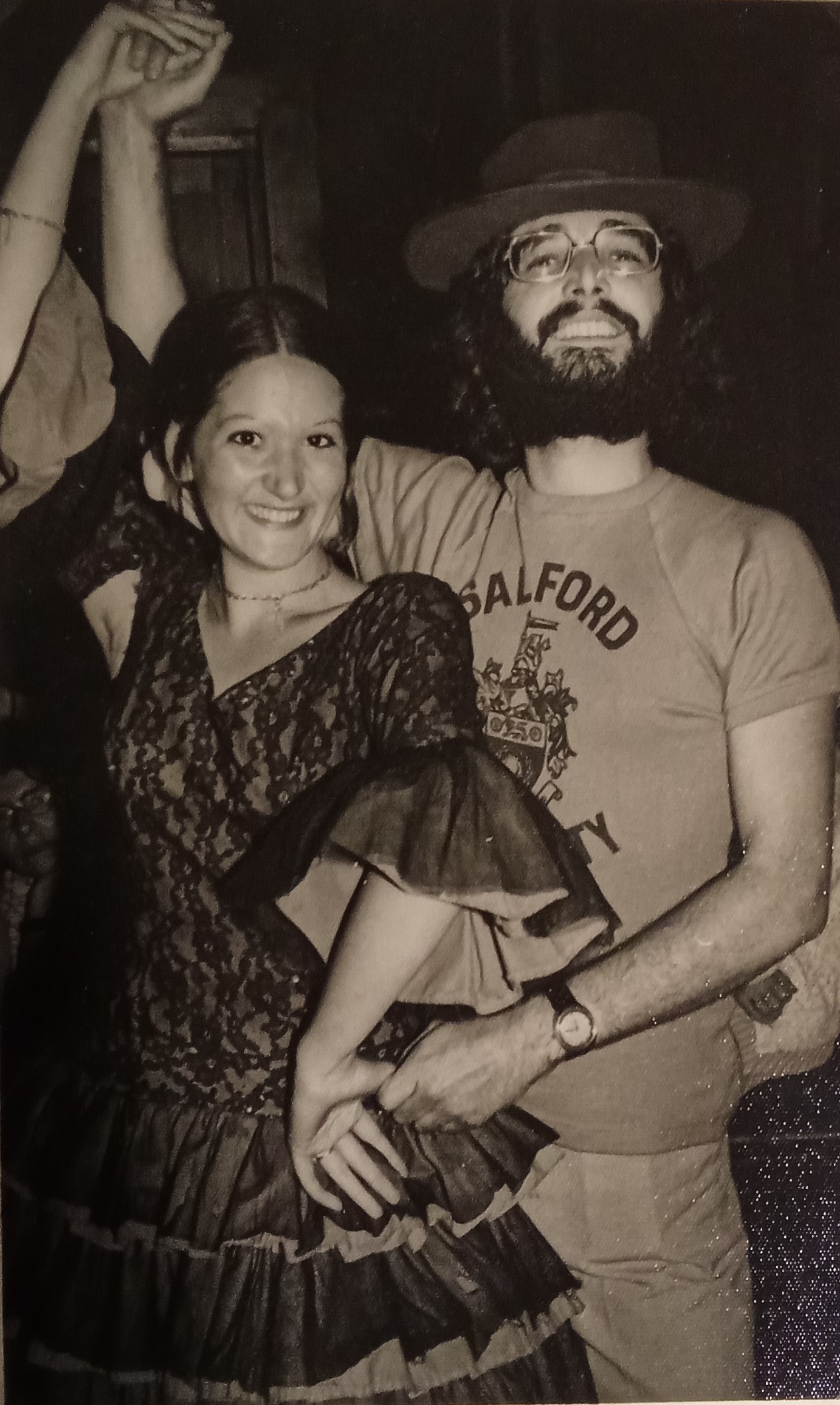
While these “pilgrims” were letting their hair (and knickers) down in the Basque resort, we took them on various excursions. One of these included a flamenco show, featuring a beautiful 17-year-old Basque girl, Carmen, who was married to her dancing partner Juan and already had twin daughters.
Juan spoke to me in confidence one day. He explained that they didn’t want any more children for a while, lest it should affect their career as dancers.
Knowing that I went regularly to France to collect tourists, he asked me if I could get him “something for the weekend”, as English barbers used to ask you back in those days when the subject of contraception was pretty taboo, even in secular England.
With the help of a French colleague, I managed to get hold of the contraceptive Pill.
My flamenco-dancing “clients” were delighted.
However, a few months later, Juan came to me with a complaint. The pills hadn’t worked and Carmen was pregnant again.
I found out she had been inserting the pills in her back passage. She thought they were suppositories!
Me posing with Carmen in 1970 [Photo: Alberto]
Epilogue
 Franco died in 1975, his nominated successor Juan Carlos took over and, together with like-minded politicians, led the country to democracy by 1977. Franco died in 1975, his nominated successor Juan Carlos took over and, together with like-minded politicians, led the country to democracy by 1977.
Spain changed rapidly: regional languages were permitted, divorce became accessible, sex was no longer a dirty secret and chaperones disappeared. Gender equality slowly entered many walks of life.
Juan Carlos being sworn in as King [Adam Smith Institute]
Spain had become democratic and free again after a gap of some four decades.
Interesting link:
Fellow British blogger, Lenox Napier, recently posted this memory of Spain and suppositories:
The Train-ride
***
.jpg)
Some of us students in the fishing harbour in San Seb in 1970
I am 2nd from left [Photo: Anon]
© Paul Whitelock
Photos and Images:
Adam Smith Institute, Alberto, BBC, EWN, Facebook, Wikipedia
Acknowledgements:
DORFE, EUTG, University of Salford
Tags:
abortion, asturiano, balear, banned, Basque, Basque separatists, British and Irish Catholics, career as dancers, Carmen was pregnant again, catalán, chaperones disappeared, contraception, contraceptive Pill, couples were chaperoned, degree in Spanish, divorce, divorce became accessible, DORFE, Durex, ETA, euskera, EUTG, fascist, flamenco show, France, Franco, gallego, gender equality, General Franco, guardia civil, inserting the pills in her back passage, Juan Carlos, Lenox Napier, Lourdes, no contraception available, no “johnnies”, no Pill, Paul Whitelock, pilgrims, prostitution was condoned, regional indigenous languages, regional languages were permitted, role of the Church, Roman Catholic Church, sex, sex before marriage, sex was no longer a dirty secret, shrine of St Bernadette, secular England, “something for the weekend”, Spain, Spain was a dictatorship, strictly religious, suppositories, taboo, tourist guide, University of Salford, valenciano
áéíóú
 0
Like
Published at 8:06 PM Comments (0)
0
Like
Published at 8:06 PM Comments (0)
Spam post or Abuse? Please let us know
|
|